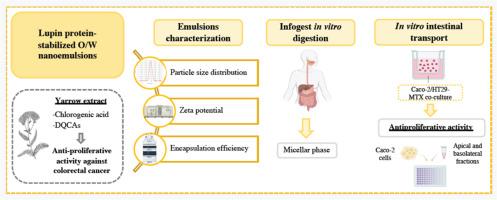Encapsulation of yarrow phenolic compounds in lupin protein nanoemulsions increases stability during gastrointestinal transit and delivery in the colon
IF 5.1
Q1 CHEMISTRY, APPLIED
引用次数: 0
Abstract
This study aimed to assess the behaviour of phenolic compounds from yarrow extract encapsulated in nanoemulsions during in vitro gastrointestinal digestion. Oil-in-water nanoemulsions were developed using grape seed oil and lupin protein (LPI) as oil phase and emulsifier, respectively. The use of 6 % LPI including 1 mg/mL of yarrow extract resulted in nanoemulsions with a homogeneous particle size distribution (200 nm) and an encapsulation efficiency of 85.6 %. During in vitro gastrointestinal digestion, most of the phenolics remained encapsulated, being protected from degradation. The in vitro bioavailability of the encapsulated phenolics was measured using a cell co-culture model (Caco-2/HT-29MTX). In this regard, nanoemulsions did not increase the bioavailability of yarrow phenolics, instead, they promoted their access to the colon. Finally, the antiproliferative activity was determined in Caco-2 cells, observing that the apical fraction inhibited cancer cells, indicating the bioefficacy of the non-absorbed phenolics. Thus, this study underscores the potential of LPI-stabilized nanoemulsions as a vehicle for protecting and delivering yarrow phenolics to the colon.

将西洋蓍草酚类化合物封装在羽扇豆蛋白纳米乳液中可提高胃肠道转运和结肠输送过程中的稳定性
本研究旨在评估包裹在纳米乳液中的西洋蓍草提取物中的酚类化合物在体外胃肠道消化过程中的表现。研究人员使用葡萄籽油和羽扇豆蛋白(LPI)分别作为油相和乳化剂,开发了水包油纳米乳剂。使用含有 1 毫克/毫升西洋蓍草提取物的 6 % LPI 可制成粒度分布均匀(200 纳米)的纳米乳剂,封装效率达 85.6 %。在体外胃肠道消化过程中,大部分酚类物质仍被包裹,免受降解。利用细胞共培养模型(Caco-2/HT-29MTX)测量了封装酚类物质的体外生物利用率。在这方面,纳米乳剂并没有增加西洋蓍草酚的生物利用率,相反,它们促进了西洋蓍草酚进入结肠。最后,测定了 Caco-2 细胞的抗增殖活性,观察到顶端部分对癌细胞有抑制作用,这表明未被吸收的酚类具有生物功效。因此,这项研究强调了 LPI 稳定纳米乳液作为一种保护蓍草酚并将其输送到结肠的载体的潜力。
本文章由计算机程序翻译,如有差异,请以英文原文为准。
求助全文
约1分钟内获得全文
求助全文

 求助内容:
求助内容: 应助结果提醒方式:
应助结果提醒方式:


